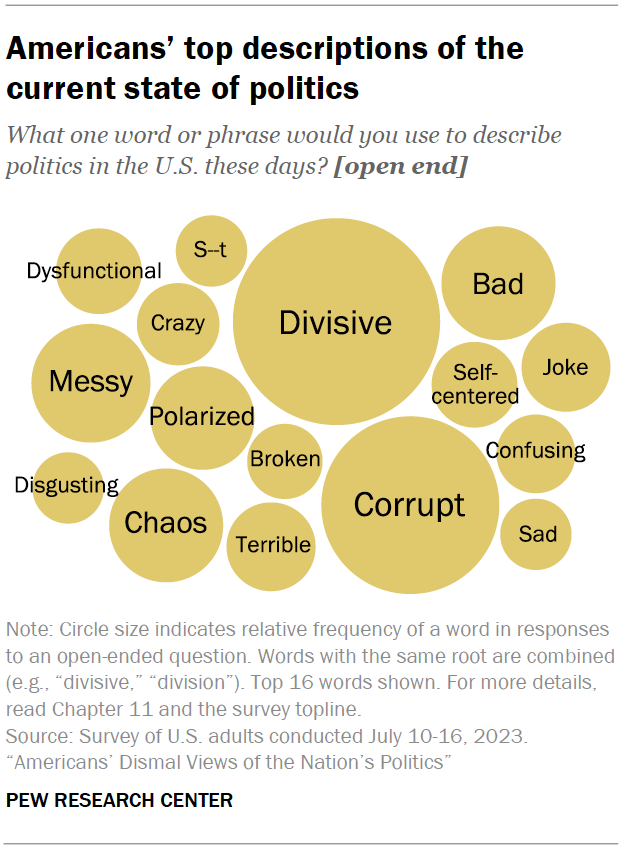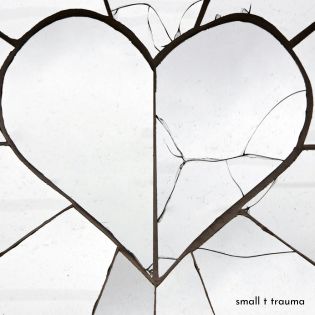
You are not alone
In a 2023 Pew survey, 65% of people reported feeling exhausted by politics often or always; 55% reported feeling angry. When asked to describe politics with a single word/phrase, the negativity of our system was overwhelming: 79% expressed a negative sentiment. Only 2% offered something positive.
A study by the American Psychological Associate found “that daily political events consistently evoked negative emotions, which contributed to worse psychological and physical wellbeing.” The Newport Institute, an organization focused on mental health in young adults aged 18-35, cited a 2019 survey, which found that over 40% of Americans identity politics as a major stressor in their life with 5% reportedly considering suicide because of political developments. A 2022 study published by the National Library of Medicine found politics was a “pervasive . . . source of chronic stress that exacted significant health costs for large numbers of American adults between 2017 and 2020.
Despite these costs, people aren’t giving up on politics. That is because politics matters. It influences our lives and the lives of those we love. So while people might turn off the news or avoid political conversations (Pew, NPR, Reuters), they are voting at the highest rates in history (US Census Bureau). And many are continuing to engage beyond the voting booth. They care deeply about our country and the society we are building. These people are often the most impacted by the negative political climate. Of the highly engaged individuals studied by Pew, 72% reported feeling exhausted always or often, 69% reported feeling angry. These highly engaged people are also the ones that believe there are solutions to today’s biggest policy questions, with 61% reporting that there are clear solutions to pressing issues. The people who can see solutions and are engaged in pushing for those are suffering the most from the corrosive nature of our politics.

Why the Trauma Lens ?
As I began to contemplate how I wanted to engage this election — an election of pivotal importance — I found myself afraid, not of the outcome of the election (though my party stokes those fears) but of how it would feel to be involved. When I imagined entering politics again, my heart rate climbed and palms began to sweat. I wondered whether I could I handle the hate and the fear. I wondered whether it would it change me, bring out my worst, most judgmental side. Political engagement didn’t feel like a safe choice, for me or for who I want to be in this world.
The lack of emotional safety in the political arena — and my bodies reaction to it — prompted me to examine politics through a trauma lens. It was a lens that I was introduced to when I left politics to run a homeless shelter. It was a lens that revealed insights into politics that a PhD in political science and a decade of political forecasting had missed.
My research revealed that politics is inherently triggering because it engages our belief systems, which is where our psychological safety is rooted. Debate, which is an inherent part of working out our political differences, challenges our core beliefs. That can make us feel unsafe. The current political environment exacerbates this due to both parties’ propensity to shame political enemies and to ostracize allies that do not walk the line.
Understanding these dynamics is key to re-imagining our politics because it creates a way forward:
- First, it underscores the need to better understand the relationship between politics and trauma. We need to understand why politics is so triggering so we can re-establish safety for ourselves and others in political spaces.
- Second, it highlights the inner work that we need to do in order to engage collectively in healthier ways. Changing our political culture requires that we, as individuals, heal from past wounds so that we can enter politics grounded in who we are.
Changing our politics requires that we bring the best of ourselves to the arena. That means we have to heal and we have to prepare our hearts for a challenging environment. That healing and that preparation is inner work: inner work that we need to do before we engage; inner work we need to do as we engage.



